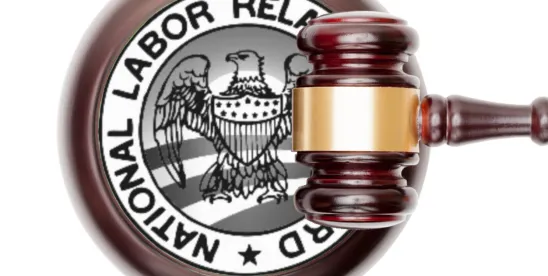Unless you have been stranded on a deserted island over the past few years, you’ve likely heard that Starbucks has been fighting a protracted battle over unionization of its employees. In addition to dealing with the union seeking to represent its employees, Starbucks also has had to contend with the National Labor Relations Board (NLRB or Board) which has, acting through its aggressive and openly pro-union General Counsel (GC), filed dozens of unfair labor practice complaints against Starbucks, alleging that Starbucks engaged in a wide range of purportedly unlawful conduct when responding to union organizing.
One of the most significant weapons in the NLRB GC’s litigation arsenal is what is known as a “10(j)” injunction. A “10(j)” refers to the section of the National Labor Relations Act that authorizes the GC to seek a preliminary injunction (also sometimes referred to as a temporary restraining order) from a federal court while administrative enforcement proceedings take place before the NLRB. These injunctions typically either prohibit an employer from taking certain actions or, more commonly, compel it to take specified action – such as rehiring employees it terminated – while an underlying unfair labor practice complaint is litigated before the NLRB. In its simplest form, a 10(j) injunction requires an employer to restore the status quo that existed prior to the alleged unfair labor practice while the legal challenge to that alleged unfair labor practice is pending before the Board.
For many years, the NLRB has argued – and a number of federal appellate courts have agreed – that the NLRB’s burden to obtain a 10(j) injunction is lower than that which is generally required for parties to obtain injunctive relief in the federal courts. For example, the Third, Fifth, and Sixth Circuits only require the NLRB to demonstrate that there is “reasonable cause to believe unfair labor practices occurred” and that injunctive relief would be “just and proper” in order to secure a 10(j) injunction. By contrast, other circuits, including the Fourth, Seventh, Eighth, and Ninth Circuits, utilize the more rigorous and traditional four-part test to gauge whether temporary injunctive relief should be granted before a matter is fully and finally litigated to judgment. That test evaluates whether (1) the NLRB is likely to succeed on the merits of the underlying unfair labor practice complaint; (2) irreparable harm will result if an injunction does not issue; (3) the balance of equities tips in favor of injunctive relief; and (4) an injunction is in the public interest.
In 2022, Starbucks terminated multiple employees at one of its locations in Memphis, Tennessee for violating company policy. The union seeking to represent those employees filed unfair labor practice charges with the NLRB, alleging that Starbucks’ decision to terminate the employees was unlawfully motivated by their union organizing activities and to discourage other employees from seeking to unionize. The NLRB issued a complaint based on those charges. While that complaint was pending – and therefore before any final determination had been rendered – the NLRB GC sought a 10(j) injunction from a Tennessee federal district court that would, among other things, require Starbucks to rehire the terminated employees pending the outcome of the unfair labor practice proceeding.
The federal district court applied the Sixth Circuit’s relaxed two-part test and concluded that the NLRB had adequately shown reasonable cause to believe Starbucks engaged in unlawful action by terminating the employees and that an injunction would be “just and proper.” The court determined that “reasonable cause” required only that the NLRB show that its legal theory was substantial and not frivolous, and that an injunction is “just and proper” if it reestablishes the status quo that existed prior to the alleged unfair labor practice – both of which are relatively low bars to clear. The district court therefore issued the injunction and directed Starbucks to rehire the terminated employees pending a final outcome on the NLRB’s administrative unfair labor practice complaint. Starbucks appealed the district court’s 10(j) injunction, and the Sixth Circuit Court of Appeals affirmed. Starbucks then took the matter to the U.S. Supreme Court.
The issue before the Supreme Court was simple enough: does the NLRB enjoy a lower burden to obtain 10(j) injunctive relief than other litigants, or does the traditional four-part test instead apply? Writing for a nearly unanimous Court (Justice Jackson partially dissented but concurred in the Court’s judgment to vacate the injunction and remand the case to the Sixth Circuit), Justice Thomas rejected the NLRB’s position that a lower burden applies to its requests for 10(j) injunctive relief. The Court held instead that the traditional four-factor test – likelihood of success; irreparable harm; balance of equities; and public interest – applies.
The practical impact of the Court’s decision is (at least) two-fold. First, it establishes a uniform standard across all federal courts applicable to NLRB 10(j) injunction requests, replacing the varying and inconsistent standards applied by different circuits. Second, it confirms that the NLRB deserves no special treatment and must meet the same standard as any other litigant insofar as it pertains to injunction requests. Going forward, the more lenient, NLRB-friendly “reasonable cause/just and proper” standard used by some circuits no longer applies. On both accounts, this is a win for employers as it not only provides certainty on the applicable standard for 10(j) injunctions, but also it levels the playing field by requiring that the NLRB meet the same standard for equitable relief that all other litigants must meet to obtain injunctive relief.




 />i
/>i

